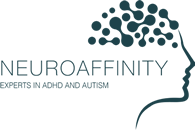Do you constantly feel scattered, distracted, or overwhelmed by tasks that others seem to manage with ease? Does your child struggle to sit still or focus, even when they’re trying their best?
If so, you’re not alone and you may be asking yourself a crucial question:
What are the most common symptoms of ADHD, and could they explain the way I or someone I love experiences the world?
Understanding these signs is more than just a label – it’s the first step toward clarity, support, and finally feeling understood.
What Is ADHD?
Attention Deficit Hyperactivity Disorder (ADHD) is a neurodevelopmental condition that affects how a person concentrates, regulates their energy, and manages impulses.
It’s often misunderstood as simply being “hyper” or “easily distracted,” but in reality, it’s far more complex, especially in adults and women, where symptoms often go unnoticed.
If you’re new to this, our what is ADHD guide provides a detailed and compassionate introduction to the condition.
5 Common Symptoms of ADHD
While ADHD looks different for everyone, several hallmark symptoms tend to appear across the board. Recognising these can be life-changing.
Some of these symptoms include:
1. Difficulty staying focused
People with ADHD often find it incredibly hard to concentrate, even on things they care about.
Your mind might drift mid-conversation, reading may feel exhausting, or you may frequently zone out without meaning to. At school or work, this can be misunderstood as laziness or carelessness. When in truth, it’s anything but.
ADHD isn’t a lack of attention. It’s an inability to control what you’re paying attention to.
2. Forgetfulness and disorganisation
Keys, phones, appointments, deadlines – they all seem to vanish or slip through the cracks.
Living with ADHD can feel like constantly playing catch-up, even when you’re genuinely trying your best.
This symptom can be especially difficult in adulthood, where life admin piles up fast.
3. Restlessness and hyperactivity
For children, hyperactivity may look like fidgeting, climbing, or bouncing from one activity to the next.
However, in adults, ADHD often shows up as internal restlessness like a racing mind, trouble relaxing, or the feeling of being “on edge” all the time.
This can be especially draining and confusing when others expect calm and focus.
4. Impulsive decisions and speaking without thinking
Blurting out thoughts, interrupting others, or acting on impulse (even when you know better) are all common traits.
This doesn’t mean someone is rude – it means the brain’s ability to filter and pause before action is working differently.
Impulsivity can impact everything from finances to relationships, making self-understanding essential.
5. Emotional sensitivity and mood swings
While not on every diagnostic checklist, emotional dysregulation is a powerful part of many ADHD experiences.
You might feel everything more intensely, from frustration and rejection to joy and excitement.
This is especially common in women and girls, where ADHD is often missed or misdiagnosed. You can learn more about this in our specialist ADHD Assessment for Women service.
Less Common Symptoms of ADHD
Some signs of ADHD are less widely recognised but can have just as much impact on day-to-day life, including:
- Chronic overwhelm or emotional burnout
- Extreme sensitivity to criticism or rejection (RSD)
- Hyperfocus on specific tasks or interests
- Sleep issues, such as delayed sleep cycles or racing thoughts at night
- Struggles with time perception and planning (time blindness)
- Low self-esteem rooted in years of misunderstood behaviour
These lesser-known ADHD symptoms are especially common in women and girls, whose struggles are often masked or misdiagnosed.
Not sure where to begin? Try our free online ADHD quiz to explore your symptoms.
How ADHD Symptoms Appear in Children
In children, ADHD can show up in ways that are often misunderstood as simply “bad behaviour” or “being overactive.” But the reality is much deeper. Recognising the most common symptoms of ADHD in children can be life-changing.
Common signs include:
- Constant fidgeting or restlessness
- Difficulty focusing, even on activities they enjoy
- Struggling to follow instructions or complete tasks
- Impulsivity (interrupting, blurting out, or acting without thinking)
- Emotional outbursts or intense reactions to frustration
- Seeming to “tune out” or appear forgetful, especially with daily routines
These behaviours can affect school performance, friendships, and self-esteem. If these traits sound familiar, it may be time to consider a Child ADHD Assessment for children aged 7 and up.
How ADHD Symptoms Appear in Adults
Many adults with ADHD go undiagnosed, often blaming themselves for feeling “scattered,” forgetful, or disorganised, without realising these may be signs of something more. ADHD in adults isn’t about being hyper – it’s about living with a brain that’s wired differently.
Common ADHD symptoms in adults include:
- Trouble staying organised, managing time, or remembering tasks
- Feeling overwhelmed by everyday responsibilities
- Difficulty focusing on conversations, reading, or work
- Racing thoughts or difficulty relaxing
- Impulsivity (in spending, decision-making, or speech)
- Chronic procrastination or a “last-minute” work style
For many, there’s a lifetime of feeling like they’re underachieving, despite their best efforts. If this resonates, an Adult ADHD Assessment can offer clarity and open the door to real support.
Why an ADHD Diagnosis Matters at Any Age
An ADHD diagnosis is not about labelling. It’s about understanding the ‘why’ behind your struggles, and finally being able to take control.
Getting a diagnosis can:
- Improve self-confidence and mental health
- Make sense of lifelong struggles with focus or emotions
- Unlock tailored ADHD treatment options
- Help you access workplace or academic accommodations
- Strengthen relationships through better communication and support
If you’ve spent years wondering why certain things feel harder for you than others, or if your child is struggling and you’re looking for answers, an ADHD diagnosis could be the missing piece.
Clarity Starts Here
ADHD doesn’t mean you’re lazy, unmotivated, or broken. It means your brain works differently and with the right insight and tools, that difference can become a strength.
At Neuroaffinity, we offer compassionate, professional ADHD assessments for both adults and children over seven.
Ready to find out more? Contact us today or check out our ADHD FAQs to find out more information.

Talhah Malik
Dr Talhah Malik is a Consultant Forensic Psychiatrist specialising in ADHD and autism. He leads secure inpatient services, provides medico-legal assessments, and is passionate about evidence-based, person-centred care.


